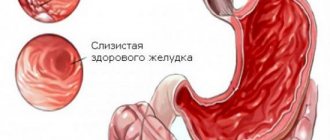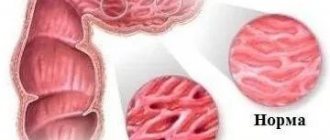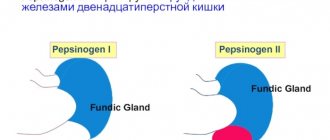Acute gastritis is usually understood as an inflammatory process affecting the gastric mucosa, caused by the negative influence of aggressive external factors, presented in the form of strong irritants. These include alcoholic beverages, unstable emotional state, and poor diet.
Against the background of gastritis, the normal functioning of the stomach is disrupted, resulting in a disorder of the digestive system. Patients with this disease must seek help from a gastroenterologist, otherwise the likelihood of complications increases.
Causes
Among the reasons leading to gastritis are:
- Unstable food intake and poor diet;
- Active consumption of fatty, spicy, fried, salty and smoked foods, the same applies to carbonated drinks;
- Presence of bad habits: consumption of tobacco products and alcohol-containing drinks on an ongoing basis;
- Taking medications of a different spectrum for a long period of time without medical supervision;
- Strong emotional stress;
- Frequent consumption of hot drinks without prior eating;
- Inflammatory processes in the gastric mucosa caused by weakened immunity and the negative influence of environmental factors.
In most cases, the disease is caused by the bacterium Helicobacter pylori. Once in the body, it begins to produce toxins and enzymes, under their influence the protection of the gastric mucosa is reduced, this, in turn, leads to the occurrence of inflammatory processes.
This type of bacteria often enters the human body along with poorly cooked food and water. Another way this bacterium enters involves contact with a sick person or things he/she used. It is important to note that the likelihood of becoming infected when living with a sick person in the same area is small; the chances increase if certain conditions are present.
Reasons for the development of gastritis
- The first and most important reason is nutrition. The disease occurs as a result of overeating or undereating, eating foods that are too fatty or salty, chewing poorly, or eating foods on the go. It is necessary to diversify your diet with foods rich in vitamins and fiber.
- Abuse of bad habits. The alcohol contained in alcohol slows down metabolic processes in the body, disrupts the functioning of other organs and the acid-base balance in the intestines. Smoking also becomes one of the most important causes of gastritis, reducing the amount of oxygen entering the stomach with the blood.
- Use of medications. Many drugs, such as painkillers, antihistamines, anti-inflammatory drugs, irritate the walls of the stomach. Therefore, such medicinal products should always be taken after eating food and not exceed the dose.
- Nervous disorders and stress. During constant nervous tension, cortisol and adrenaline are released in the stomach, which provokes the development of pathology.
- Allergic reaction. Untreated allergies can lead to the development of the disease.
Acute gastritis - symptoms
Practice shows that the first symptoms of acute gastritis have much in common with signs related to other diseases. Among them are:
- After finishing a meal, there is heaviness and discomfort in the abdomen;
- Lack of desire to eat;
- Heartburn;
- The appearance of an unpleasant taste in the mouth;
- Nausea;
- Involuntary belching;
- Vomiting;
- Bloating;
- Abnormal stool;
- Increase in body temperature to 37 °C.
In most cases, the presented list of symptoms begins to appear after eating and can persist for 6-14 hours. The cause of these manifestations is indigestion. In conditions of deficiency of special enzymes involved in the digestion of food, the digestion process begins to take longer.
Complications of acute gastritis are accompanied by pain, in which case it is recommended to urgently seek help from a doctor in order to avoid more complex consequences for the body.
The presented digestive disorders are characteristic of many diseases of the gastrointestinal tract. For this reason, you need to go to an appointment with a gastroenterologist, who, based on the examination and test results, will make an accurate diagnosis and formulate a course of treatment.
It is not recommended to resort to self-medication, this is especially true when it comes to acute gastritis in children, this approach can lead to negative consequences.
Types of gastritis
The disease is classified taking into account the characteristics of the pathological process and the severity of symptoms of gastritis. Based on the identified abnormalities in the functioning of the organ, the main types of gastritis are distinguished:
- Acute form. In most cases, it is caused by non-compliance with nutritional standards, the predominance of spicy, fatty foods, and unnatural seasonings in the diet.
- Atrophic form, in which superficial, acute, moderate and chronic stages are distinguished. This form of gastritis is characterized by dysfunction of the stomach and changes in the consistency of gastric juice.
- The chronic form, which is a consequence of illiterate treatment of acute gastritis or ignoring severe symptoms.
- Gastritis with increased acidity. When acid is actively produced in the stomach, wounds can form.
- Antacid gastritis, in which the process of digesting food is difficult due to a lack of gastric juice.
Depending on the degree of damage, the forms of the disease can also be distinguished: at the initial stage there are few lesions and gastritis can be treated quite effectively. The average (moderate) form is complicated by an increase in the number of affected cells; the severe form of gastritis is characterized by obvious damage to the walls of the organ.
Classification
Gastritis is a common problem among patients of different ages, and it can be expressed in different forms. At the present stage, doctors classify acute gastritis according to the following criteria:
- According to the depth of inflammation:
- Superficial (partial damage to the mucous membrane);
- Deep (complete damage to the mucous membrane).
- By prevalence:
- Local (affects a specific area);
- Diffuse (spreads over the entire area).
- According to etiology:
- Infectious (penetration of bacteria into the body);
- Non-infectious (manifestation of allergic reactions, entry of chemicals into the body, reduced immunity).
4. According to the nature of the inflammatory process:
- Catarrhal - accompanied by the appearance of redness and swelling of the mucous membrane. In most cases, it is caused by the abuse of junk food;
- Fibrinous - can be caused by infection or poisoning with chemicals, in practice it is rare; when present, a gray or yellow-brown film appears on the walls of the stomach;
- Hemorrhagic (corrosive) - this type is usually classified as a severe form of the disease. Violation of the integrity of the gastric mucosa is the result of exposure to chemicals entering the body;
- Phlegmonous - in this case, destruction of the mucosal wall is observed under the influence of pus, as a result it penetrates into the submucosal tissue. It appears against the background of injuries, infections, complications of oncology or stomach ulcers.
What is a challenge card
An ambulance call card is a document (from the Latin documentum - evidence) confirming the timeliness and correctness of the diagnosis, the therapy performed and the tactics of managing the patient in emergency medical care.
The ambulance call card has three purposes:
- medical (contains medical information about the patient);
- legal (allows you to determine the person responsible for actions performed or not performed during treatment);
- economic (confirms the financial costs of diagnostic and treatment measures).
Therefore, all entries in the call card (complaints, anamnesis, objective data, etc.) must be logically connected, confirm the diagnosis, and correspond to the tactics and medical care provided. Records must be clear, easy to read, without corrections, with appropriate signatures and transcripts.
Careless filling out of the call card creates the impression that the doctor is dishonest about his duties. Most often, references to various difficulties in work sound unconvincing. When drawing up a call card, you must follow the principles of completeness, accuracy and unambiguity.
A call card is a document in which the doctor records the complaints of the patient being examined, the history of the severity of his condition and other important factors.
Diagnostics
The question of how to treat gastritis is relevant for many people faced with this problem. First of all, it is necessary to undergo a comprehensive diagnosis. Its purpose is to determine the specifics of the disease in a particular case. As part of the diagnosis, the doctor interviews the patient and examines him. During the dialogue, the doctor asks the patient what he ate before symptoms appeared, what medications he uses, and whether he has any concomitant diseases. Among the signs indicating the presence of acute gastritis in a patient are problems with the skin, plaque on the tongue, rashes between the nose and lips, and an unpleasant odor from the mouth. When palpating the abdomen, pain occurs.
To confirm or refute the diagnosis, the gastroenterologist must conduct a comprehensive study, the results of which allow one to obtain an accurate answer to the question of what the patient is sick with.
Emergency call card for chronic gastritis
Calling an ambulance is a necessary step if you feel extremely unwell. Conscious citizens do not often resort to calling an ambulance, but still, every person should be aware of the rules for calling a medical team, know what documents to provide and how to correctly inform the arriving doctor about his diagnosis. For gastritis, the emergency call card has its own characteristics, which the patient should know about in advance. The website https://gastritinform.ru// describes in detail the features of compiling an emergency care map for chronic and acute gastritis.
Diagnosis, treatment and prevention of chronic gastritis
Diagnostics
Diagnosis of the disease is carried out by a gastroenterologist or therapist.
To make a diagnosis, the doctor determines the scope of necessary research. You may need to do:
- clinical blood test
- biochemical parameters (prescribed by a doctor)
- Ultrasound of the abdominal organs
- fibrogastroduodenoscopy (FGDS) with a test for Helicobacter pylori and pH-metry, if necessary, with collection of material for morphological research
- urease breath test for Helicobacter pylori
- blood donation for specific antibodies to Helicobacter pylori or stool test for Helicobacter pylori antigen
- gastropanel.
Treatment
Main goals of treatment:
- pain relief
- destruction of Helicobacter pylori (eradication)
- preventing the development of complications
- correction of complications that have arisen.
Patients with chronic gastritis are treated on an outpatient basis. Treatment is carried out comprehensively:
- Diet (mechanically and chemically gentle).
- Quitting alcohol and smoking.
- Taking antisecretory, antacid drugs and antibiotics that affect peristalsis and regeneration processes of the mucous membrane.
The dosage, frequency and duration of taking any medications are prescribed exclusively by a specialist . As a rule, self-medication does not lead to recovery and only slightly reduces the intensity of the manifestations of the disease, and also threatens to increase the frequency of side effects of the drugs taken.
Prevention
To prevent chronic gastritis, you must adhere to some rules:
- Quitting smoking and alcohol abuse.
- Compliance with the work and rest regime.
- Dieting.
- Repeated courses of destruction of Helicobacter pylori (if necessary).
- Preventive medical examinations and medical examinations.
If symptoms of chronic gastritis appear, you should consult a gastroenterologist who can assess your condition, prescribe the necessary examination and adequate individual treatment.
Gastritis emergency medical call card
An emergency medical call card is equivalent to a medical history and is a legal document with all the ensuing consequences. The diagnostic and treatment process consists of collecting (receiving) clinical and paraclinical information about the patient, his disease and establishing a diagnosis.
The complaints section sets out the complaints that led the patient to the doctor, in this case to calling an ambulance. Clarification of complaints goes in two ways: ACTIVE AND PASSIVE. In the first option, the doctor himself asks the necessary questions; in the second, he listens to the complaints expressed by the patient. An experienced doctor must demonstrate his ability to select the most important thing from the entire flow of information to make a diagnosis.
First of all, it is necessary to find out when the attack occurred, how it manifested itself, and what was the cause. How did the patient stop the attack today and earlier? Compare the effect. When carrying out differential diagnosis with angina pectoris, it is necessary to indicate how the patient’s motor activity has changed after the attack, the nature of the pain, localization, irradiation, and whether the patient has called an ambulance in similar cases before.
When examining a patient, each degree of severity of gastritis must correspond to fairly specific answers to questions in the gastritis call card
The doctor must clarify how, in the patient’s opinion, the attack is similar, and if it turns out that the previous attack was accompanied by a life-threatening condition, then such “similarity” should alert the doctor. Only after a carefully collected AP should one proceed to collecting an anamnesis of the disease (anamnesis morbi) - if time, situation and condition of the patient permit.
The assistance provided to the patient must be adequate to the diagnosis. If for some reason the doctor considers it necessary to prescribe a drug that is not widely used for this pathology, he must stipulate this in the call card, indicating the reason for his decision. When examining a patient, each degree of severity of gastritis must correspond to fairly specific answers to the questions in the call card.
What is gastritis
Gastritis is an inflammatory process that spreads to the gastric mucosa. The disease can develop over a long period of time and be accompanied by impaired tissue epithelization. As a result, the functioning of the organ is disrupted due to changes in the secretion of hydrochloric acid and the replacement of glands with scar elements.
The patient needs to know what causes gastritis in order to be able to prevent the development of the disease. There are a large number of reasons why gastritis appears. Currently, it is believed that inflammation is caused by a complex of various unfavorable factors. If acute gastritis occurs, its causes are often associated with exposure to toxic factors, excessive alcohol consumption, and food poisoning.
Chronic gastritis, the causes of which cannot always be identified, is associated with prolonged poor diet, Helicobacter pylori infection, and stress. If the patient is bothered by gastritis, the causes of which are not precisely established, they speak of an autoimmune form of the disease.
It can be provoked by diseases of the thyroid gland, skin and cardiovascular system. Less commonly, inflammation is caused by specific infections such as cytomegalovirus, herpes simplex virus or Epstein-Barr virus. At the first signs of the disease, it is forbidden to begin treatment using traditional methods, as well as take medications on your own. Therapy should be carried out under the supervision of a specialist after a thorough diagnosis.









